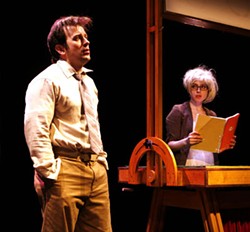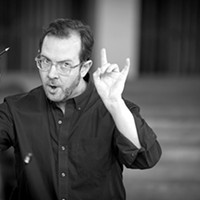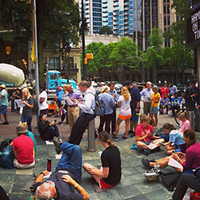Charles Wadsworth has been involved with Spoleto from the moment that the hilltop village in Umbria became associated with the great arts festival back in 1960. He introduced the first noonday chamber music concerts, in a patois of English and Italian, years before the USA version of Spoleto became a gleam in founder Gian Carlo Menotti's eye.
Wadsworth has seen it all, from the first day that Menotti's vision became reality in Charleston at the first Spoleto Festival USA in 1977. So when he faced the one o'clock audience last Thursday at Dock Street Theatre and told us that there had never been balmier, more perfect weather for the first week of Spoleto, he spoke with unimpeachable authority.
As a citizen of the world who wears his eccentricity proudly, Wadsworth offered a theory explaining why Charleston has eluded the ravages of global warming. Grits. Strolling through the unseasonably cool breezes to his customary hosting gig, Wadsworth had recalled the unusually high consumption of grits-per-capita in the South Carolina lowcountry, shrewdly connecting cause and effect.
So before yielding the stage to Handel, Dvorak, Schubert and Alessandro Scarlatti, Wadsworth urged us to increase our intake of grits while at Spoleto. A liberating prescription when you consider all the cholesterol you can heap on grits.
Ah, but sentimentalists might attribute the special weather dispensation to Menotti himself, who died on Feb. 1 at the age of 95. The breach between Menotti and Spoleto Festival USA was never healed after the two parted company in 1993. Rather touching, then, that a free concert honoring the composer was added to the festivities on the same morning that Wadsworth propounded the Grits Effect.
The spirit of Menotti -- expounded upon in eulogies from choral director Joseph Flummerfelt and Mayor Joseph P. Riley -- continues to preside at Spoleto. As always, there's a calculated mix of artistic comfort food mixed with outrageous, outlandish exotica that stretches and tears the envelope.
No matter how far you travel to see Spoleto during its 17 days -- and current artistic director Nigel Redden boasts that 48 of the 50 states are represented by ticketholders at this year's festival -- you can discover an opera, a musical composition, a dance company or a jazz artist that you'll find nowhere else. Adventure, risk and discovery make the experience of Spoleto an addictive brew.
Here are the finds and the flops through the first two weekends of Spoleto 2007, listed within categories in order of preference (shows and events still running are indicated in parentheses):
Opera
With three audacious programming choices, including two American premieres, it's little wonder that this year's opera lineup is causing most of the buzz. As we predicted here, the Gluck rarity delivers the most unalloyed pleasure.
L'ile de Merlin (through June 9) -- Gluck's rare excursion into comedy has lingered in obscurity for 249 years before reaching America, but co-directors Christopher Alden and Roy Rallo refuse to treat this one-act satire like a museum piece. The camaraderie of shipwrecked heroes Scapin and Pierrot, though sung in French, has a contemporary Beavis-and-Butt-head flavor, and the subtitle of the piece -- "The World Turned Upside Down" -- is given far more play than Gluck's original island ambiance.
The reverse of mid-18th Century Paris is a Utopia where fidelity is de rigueur, the rich are required to marry the poor, and physicians pleasure their patients instead of bleeding them. But there is a certain sterility about the Alden-Rallo version of paradise, keeping us indoors with automated carts, flat screen TV and stiff cartoonish characters. Argentine and Diamantine, the women destined for our heroes, are as much matched bookends as they are beauties. So the bliss that comes to Scapin and Pierrot on this enchanted isle should remind you of those infamous Enzyte penis pill ads featuring Smiley Bob and his matching wife.
The music and the singing are superb, and the costumes are a stitch -- especially Le Philosophe encased in a smiley face.
The Rise and Fall of the City of Mahagonny (June 9) -- After the wildly successful American premiere of Die Burgschaft in 1999, it was inevitable that Spoleto would take up Kurt Weill's more familiar fare. Emanuelle Villaume and his Spoleto Festival USA Orchestra dig zestfully into the score, but it's the design team -- set designer Christian Fenouillat and costume designer Agostino Cavalca -- who really dazzle, capturing the seedy spirit of Bertolt Brecht's anti-capitalist barrage.
Richard Brunner, if not brimming with charisma, sings Jimmy Mahoney in a piercingly tragic tenor. Except for the roguish Timothy Nolen as Trinity Moses, the rest of the principals are also hit-and-miss. As Begbick, Karen Huffstodt swaddles every note with a wide, clangorous wobble, but I couldn't keep my eyes off her flamboyant dynamism. Worse were Beauregard Palmer as Fatty and Tammy Hensrud as the harlot Jenny Hill -- both somehow managed to vanish in blandness.
Faustus, The Last Night -- Who says opera needs dialogue, conflict and tension? Not wunderkind Pascal Dusapin, whose 21st Century pastiche of Marlowe, Goethe, Shakespeare and Beckett spread a quintet of characters across the Sottile Theatre stage without bothering to have anybody -- except Faustus and Mephistopheles -- communicate with one another.
Writing in a language he can hardly speak, however, Dusapin weds text and music together better than any recent composer/librettist who has worked with the English language. I admit finding a certain charm in Meph's passing off bogus astrology on Faust as true science -- and a fascination in Dusapin's blinding treatment of enlightenment. On balance, this was a Night that brimmed with boredom.
Theater
Nothing timid about this year's stage lineup. Even the comfort food at Dock Street Theatre, Somerset Maugham's Constant Wife, has some bite to it.
Major Bang -- Written by Kirk Lynn, Bang is a wonderfully weird stew that borrows shamelessly from such disparate sources as Dr. Strangelove, The Bodyguard and Homeland Security's ready.gov website. Drop actor-magician-Lennie Bruce impersonator Steve Cuiffo into the pot, and you can easily imagine an evening where everything seems to come at you unexpectedly from left field.
Yet there's a storyline that helps it all to cohere, centering on two characters at a radioactive facility, Frank Farmer and his conflicted boss, Rachel. Sure, Rachel realizes that Frank is a fuck-up, his latest catastrophe allowing his reclusive son to pilfer fissionable material from the plant during a Cub Scout tour. But she's aching, a la Whitney Houston, for Frank to ask her out.
Maggie Hoffman does the honors as the repressed nympho in this two-hander. Cuiffo portrays both the hapless Farmer and his son, based on a true-life teen who built a nuclear reactor in his garage. Above all, Cuiffro goes into vulpine mode to do the title character, the insane scoutmaster bent on nuclear conquest. Truly a blast.
blessing the boats -- Two kidney transplants have turned poet Sekou Sundiata into a crusader for organ donations. Sundiata also proved to be a compelling performer telling his own story, which he has been touring with since authoring his solo piece in 2002. It's a testament to tenacity, of course, peppered with the agonies of waiting for a donor, undergoing dialysis, and feeling the effects of the medicine cocktails designed to ward off organ rejection.
Sweetening Sundiata's narrative were his accounts of "earth angels" who came to his aid at the most agonizing points in his epic ordeal. Catch this informative, sobering and inspiring piece if it comes to Charlotte.
The Constant Wife (June 10) -- Maugham's thesis comedy has staunch feminist leanings from the outset as we get to know the wronged wife, Constance Middleton. Midway through Act 2, Maugham seems willing to go beyond Shaw and Wilde in boldly advocating open marriage. But the playwright eventually retreats from such radicalism.
It's a deft retreat, however, so Dr. John Middleton still feels the sting of his wife's emancipation. And the Gate Theatre production, with Paris Jefferson nearly divine in the title role, is exquisitely tailored without succumbing to British reserve. Simon Coates as Dr. John is comically choleric in his discomfiture, and the rest of the cast is very solid behind the troubled couple.
But not always audible when they switch from moral disputation to witty repartee. Sit close to the stage if you can.
medEia -- Hailing from Amsterdam, the Dood Pard (Dead Horse) company certainly has a unique way of reinventing Euripides' fiery tragedy. With all three performers portraying the chorus -- and taking turns, regardless of gender, portraying the major roles of Jason and Medea -- this modernization by Oscar van Woensel managed to extinguish Euripides' fire, making a torridly personal conflict almost totally impersonal. A sprinkling of Beatles lyrics in the dialogue actually added humor to a melodrama that is usually bloody and humorless.
Musical interludes, hearkening back to the ceremony of Greek drama, allowed the actors to take a break and watch slide shows with the rest of us. Jason's photos from his travels in search of the Golden Fleece? Perhaps. But this remake, presented with a simplicity akin to the Mac-PC commercials, sustained only a loose grip on my interest.
Dance
The highlights have been Rubberbandance, with its unique synthesis of classicism and hip-hop, and the Batsheva Dance Company from Tel Aviv. Forget the hora and other Jewish wedding frou-frou. This company, presenting choreographies by artistic director Ohad Naharin, was relentlessly purposeful, rebellious and grim. Even religious ritual seemed to be portrayed as regimented hysteria. Shen Wei Dance Arts started out promisingly, with fascinating new idioms of movement and partnering. But their Connect Transfer grew wearisome around the 40-minute mark, and its most colorful gimmick -- painting the white floor with their bodies -- would have been far more effective on a raked stage.
Jazz
The Grits Effect turned stormy over the second weekend, forcing the Faustus company to do their final performance with house lights turned on and pushing the outdoor jazz concert scheduled at The Cistern indoors to the Gaillard Auditorium Exhibition Hall. Best memories of The Cistern -- and this year's jazz series -- remained the charismatic René Marie, who militantly emphasized her own songs on the balmy opening weekend. Renato Braz was as impressive at Gaillard as I'd remembered him from 2004, backed by percussion superstars Sizão Machado and Bré. Those of us who weathered the typhoon on Saturday night were rewarded with a fine trio concert from Enrico Pieranunzi. Apparently, Signor P had done his moodier work earlier at this year's Spoleto in solo and duo concerts. All was fleet and fabulous with the trio.
Speaking of 1.00000
-
Blue Line Blues?
Dec 5, 2007 -
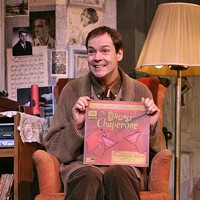
Escape Artist
Nov 14, 2007 -
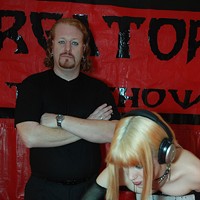
Torch
Oct 31, 2007 - More »
Latest in Performing Arts
More by Perry Tannenbaum
Calendar
-

NEW WINDOW GALLERY-Pat Rhea-ACRYLIC PAINTINGS-April 05-30 2024 VALDESE, NC 28690 @ New Window Gallery/Play It Again Records
- Through April 30, 12 p.m.
-

WHISKEY TASTING: VIRGINIA HIGHLANDS WHISKY @ Elizabeth Parlour Room
-
An Evening With Phil Rosenthal Of "Somebody Feed Phil" @ Knight Theater
-
Kountry Wayne: The King Of Hearts Tour @ Ovens Auditorium
-

Trap & Paint + Karaoke @ Zodiac Bar & Grill
-
The joy and pain of comedian Oletha Cuevas 2
-
Charlotte Symphony Teams with Punk Violinist
Flaming redhead torches Red Priest
-
Georgie Nakima Connects Communities with Environment Through Art
Bridging the gap

